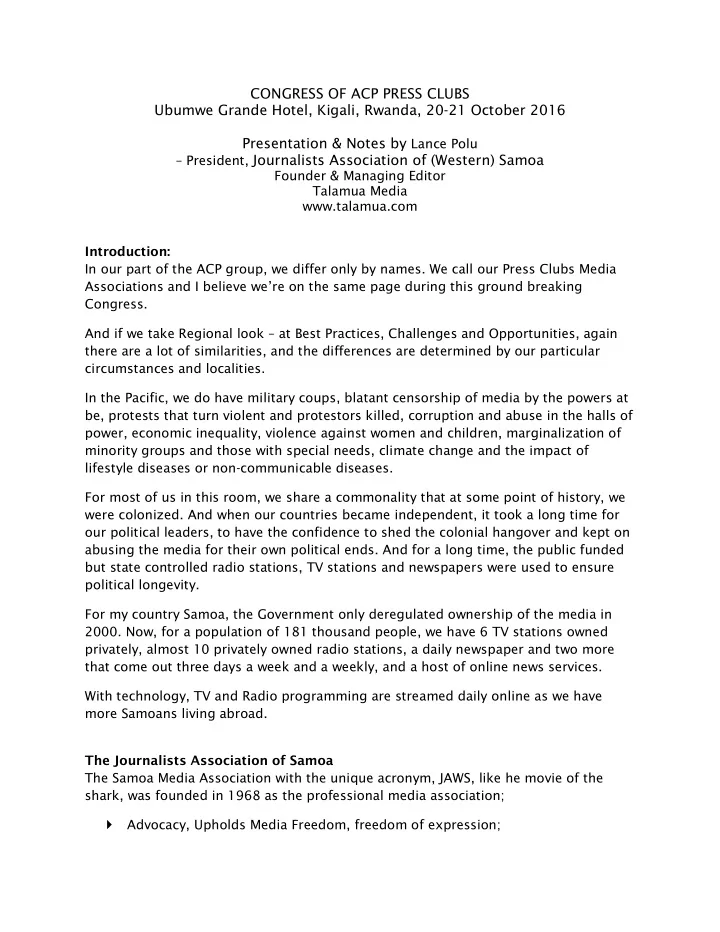

CONGRESS OF ACP PRESS CLUBS Ubumwe Grande Hotel, Kigali, Rwanda, 20-21 October 2016 Presentation & Notes by Lance Polu – President, Journalists Association of (Western) Samoa Founder & Managing Editor Talamua Media www.talamua.com Introduction: In our part of the ACP group, we differ only by names. We call our Press Clubs Media Associations and I believe we’re on the same page during this ground breaking Congress. And if we take Regional look – at Best Practices, Challenges and Opportunities, again there are a lot of similarities, and the differences are determined by our particular circumstances and localities. In the Pacific, we do have military coups, blatant censorship of media by the powers at be, protests that turn violent and protestors killed, corruption and abuse in the halls of power, economic inequality, violence against women and children, marginalization of minority groups and those with special needs, climate change and the impact of lifestyle diseases or non-communicable diseases. For most of us in this room, we share a commonality that at some point of history, we were colonized. And when our countries became independent, it took a long time for our political leaders, to have the confidence to shed the colonial hangover and kept on abusing the media for their own political ends. And for a long time, the public funded but state controlled radio stations, TV stations and newspapers were used to ensure political longevity. For my country Samoa, the Government only deregulated ownership of the media in 2000. Now, for a population of 181 thousand people, we have 6 TV stations owned privately, almost 10 privately owned radio stations, a daily newspaper and two more that come out three days a week and a weekly, and a host of online news services. With technology, TV and Radio programming are streamed daily online as we have more Samoans living abroad. The Journalists Association of Samoa The Samoa Media Association with the unique acronym, JAWS, like he movie of the shark, was founded in 1968 as the professional media association; Advocacy, Upholds Media Freedom, freedom of expression;
Training/Capacity building; Linked with similar regional bodies such as CPU, CJA, PANPA and the Pacific Islands News Association before we disassociated ourselves due to violations of media freedom in Fiji where PINA was based; 2003 there was pressure to establish a self-regulating body to regulate the media After 10 years of debate, delays and consultations, parliament finally passed the Media Council Act in May 2015. The Act establishes JAWS as the National Media Association by an Act of Parliament; (just like other professional organisations such as the lawyers, accountants and engineers). Requires JAWS to establish a Media Council as the self-regulating body for the media; The Councils Primary Function is Receive complaints from the public and adjudicates and makes decisions on such complaints. The Council has the powers to penalize or order a media outlet to make a correction or make a public apology as redress if the Council finds and upholds the complaint. Also to establish and oversee a Code of Ethics and Code of Practice for the media, provide training for media on the practice and adherence to the media codes; Media Council & Self-Regulation Establishment of a Media Council to be chaired by a lawyer of minimum 5 years working experience or a retired judge 5 representatives of the public 5 representatives of the media As of this year, we have slightly over 100 financial members covering the whole industry from TV, Radio, print, photographers, online news services, columnists, free lancers and correspondents In terms of training our young journalists, we have developed a Diploma in Media and Journalism Studies programme based at the National University and that programme will be elevated to a degree four year course starting next year. How it works is that the industry has an Advisory Board to the academic staff at the university, to ensure the relevance of the course to our work and what the industry expects of the graduates. Then coming to the proposed Federation of ACP Press Clubs.
It’s an exciting undertaking to me. Given that we have predecessors such as within the Commonwealth, we can learn from their experiences and the challenges they are facing. I’ve been part of the Commonwealth Journalists Association for 20 years now. I attended their last biennial meeting at the Open University in London last April. We are still trying to find the best possible approach as we face the: 1. The lack of money and resources 2. The scattered nature of our monster that essentially is also the nature of the ACP group. I believe that: The ACP set up as a grouping representing the African, Caribbean and the Pacific regions, is already a platform that can be used as the umbrella the Press Clubs Federation can be established; Then projects to enhance the media or exposure of the ACP and its challenges and developments, can be made through the regional ACP branches; Regional Projects such as capacity building, specialized reporting on areas EU/ACP focuses on such as social issues, women and political equity, reporting on children, the special needs and the marginalized National projects specific to members countries can address specific issues to members countries Finally, I believe the delegates from the Pacific, took the longest travel to be here in Kigali. I started travelling on Tuesday afternoon and only arrived here in Kigali last night. It took me 30 hours flying, not counting the time waiting at airports and transit lounges. That’s but one of the realities and features of the ACP Press Federation when we do launch it here in Kingali. I came all this way to lend my support to it. Thank you…
Recommend
More recommend